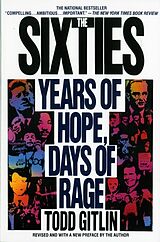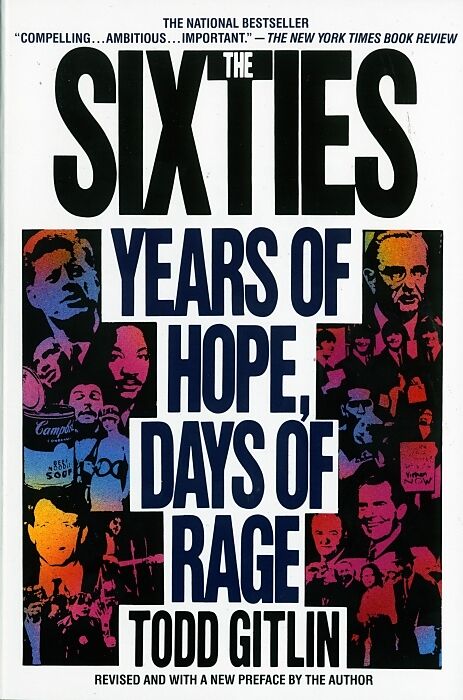The Sixties
Einband:
Kartonierter Einband
EAN:
9780553372120
Untertitel:
Years of Hope, Days of Rage
Autor:
Todd Gitlin
Herausgeber:
Random House Publishing Group
Anzahl Seiten:
544
Erscheinungsdatum:
01.07.1993
ISBN:
0553372122
Informationen zum Autor Todd Gitlin, an American author of sixteen books, is a professor of sociology at the University of California, Berkeley. He is the author of The Whole World Is Watching and Inside Prime Time , and a novel, The Murder of Albert Einstein , as well as editor of Watching Television . His articles on politics and culture have appeared in the New York Times , Harper's , The Nation , Mother Jones , The New Republic , Dissent , Tikkun , and many other periodicals and newspapers. Klappentext Say "the Sixties" and the images start coming, images of a time when all authority was defied and millions of young Americans thought they could change the world-either through music, drugs, and universal love or by "putting their bodies on the line" against injustice and war. Todd Gitlin, the highly regarded writer, media critic, and professor of sociology at the University of California, Berkeley, has written an authoritative and compelling account of this supercharged decade-a decade he helped shape as an early president of Students for a Democratic Society (SDS) and an organizer of the first national demonstration against the Vietnam war. Part critical history, part personal memoir, part celebration, and part meditation, this critically acclaimed work resurrects a generation on all its glory and tragedy.INTRODUCTION On New Year's Eve, as 1958 slipped into 1959, I wasn't especially aware I was living in the dead, dreary Fifties. I was a high school senior about to turn sixteen. I had little sense of living in any kind of Fifties at all; I wasn't old enough to think in decades. I was simply living my life: striving for grades, wondering about sex, matching my exploits against thosereal and imaginedof my rivals, watching the tides of adolescence rip through me. The only threshold I thought about was the one I would cross later that year, on the way to college. I was not living in history, but in biography. Which is not to say I was devoid of political interests. I read The New York Times and my parents were liberal. I stayed up late on election nights and rooted for Democrats almost as passionately as I followed the New York Giants baseball team (until they broke my heart by running off to San Francisco in 1958). I thought President Dwight David Eisenhower was a genial deadhead, a semiliterate fuddy-duddy who deserved to be chastised almost as much for excessive golfing and tangled sentences as for embracing Generalísimo Franco. I thought Richard Nixon was sinister. I delighted in Jules Feiffer's worldly spoofs of Eisenhower's syntax, the phone company's arrogance, and the middle class's clichés. I liked Herblock's liberal cartoons, including one in which Bernard Baruch said that Eisenhower's stinginess with the military budget would make the United States the richest man in the graveyard. A friend introduced me to H. L. Mencken's tilts at the philistine American booboisie, and when I wrote the valedictory speech at the Bronx High School of Science later that year, the only quotation was from Mencken: We live in a land of abounding quackeries. My closest friends, the children of Jewish civil servants and skilled workers, held similar opinions. As we celebrated the coming of 1959, around midnight, in a fragment of news squeezed into Guy Lombardo's orchestral schmaltz, we saw the black-and-white footage of bearded Cubans wearing fatigues, smoking big cigars, grinning big grins to the cheers of throngs deliriously happy at the news that Batista had fled; and we cheered too. The overthrow of a brutal dictator, yes. But more, on the faces of the striding, strutting barbudos surrounded by adoring crowds we read redemptiona revolt of young people, underdogs, who might just cleanse one scrap of earth of the bloodletting and misery we had heard about all our lives. From a living room in the...
Autorentext
Todd Gitlin, an American author of sixteen books, is a professor of sociology at the University of California, Berkeley. He is the author of The Whole World Is Watching and Inside Prime Time, and a novel, The Murder of Albert Einstein, as well as editor of Watching Television. His articles on politics and culture have appeared in the New York Times, Harper’s, The Nation, Mother Jones, The New Republic, Dissent, Tikkun, and many other periodicals and newspapers.
Klappentext
Say "the Sixties" and the images start coming, images of a time when all authority was defied and millions of young Americans thought they could change the world-either through music, drugs, and universal love or by "putting their bodies on the line" against injustice and war.
Todd Gitlin, the highly regarded writer, media critic, and professor of sociology at the University of California, Berkeley, has written an authoritative and compelling account of this supercharged decade-a decade he helped shape as an early president of Students for a Democratic Society (SDS) and an organizer of the first national demonstration against the Vietnam war. Part critical history, part personal memoir, part celebration, and part meditation, this critically acclaimed work resurrects a generation on all its glory and tragedy.
Zusammenfassung
Say “the Sixties” and the images start coming, images of a time when all authority was defied and millions of young Americans thought they could change the world—either through music, drugs, and universal love or by “putting their bodies on the line” against injustice and war.
Todd Gitlin, the highly regarded writer, media critic, and professor of sociology at the University of California, Berkeley, has written an authoritative and compelling account of this supercharged decade—a decade he helped shape as an early president of Students for a Democratic Society (SDS) and an organizer of the first national demonstration against the Vietnam war. Part critical history, part personal memoir, part celebration, and part meditation, this critically acclaimed work resurrects a generation on all its glory and tragedy.
Leseprobe
INTRODUCTION
On New Year’s Eve, as 1958 slipped into 1959, I wasn’t especially aware I was living in the dead, dreary Fifties. I was a high school senior about to turn sixteen. I had little sense of living in any kind of “Fifties” at all; I wasn’t old enough to think in decades. I was simply living my life: striving for grades, wondering about sex, matching my exploits against those—real and imagined—of my rivals, watching the tides of adolescence rip through me. The only threshold I thought about was the one I would cross later that year, on the way to college. I was not living in history, but in biography.
Which is not to say I was devoid of political interests. I read The New York Times and my parents were liberal. I stayed up late on election nights and rooted for Democrats almost as passionately as I followed the New York Giants baseball team (until they broke my heart by running off to San Francisco in 1958). I thought President Dwight David Eisenhower was a genial deadhead, a semiliterate fuddy-duddy who deserved to be chastised almost as much for excessive golfing and tangled sentences as for embracing Generalísimo Franco. I thought Richard Nixon was sinister. I delighted in Jules Feiffer’s worldly spoofs of Eisenhower’s syntax, the phone company’s arrogance, and the middle class’s clichés. I liked Herblock’s liberal cartoons, including one in which Bernard Baruch said that Eisenhower’s stinginess with the military budget would make the United States “the richest man in the graveyard.” A friend introduced …

Leider konnten wir für diesen Artikel keine Preise ermitteln ...
billigbuch.ch sucht jetzt für Sie die besten Angebote ...
Die aktuellen Verkaufspreise von 6 Onlineshops werden in Realtime abgefragt.
Sie können das gewünschte Produkt anschliessend direkt beim Anbieter Ihrer Wahl bestellen.
Loading...
Die aktuellen Verkaufspreise von 6 Onlineshops werden in Realtime abgefragt.
Sie können das gewünschte Produkt anschliessend direkt beim Anbieter Ihrer Wahl bestellen.
| # | Onlineshop | Preis CHF | Versand CHF | Total CHF | ||
|---|---|---|---|---|---|---|
| 1 | Seller | 0.00 | 0.00 | 0.00 |
